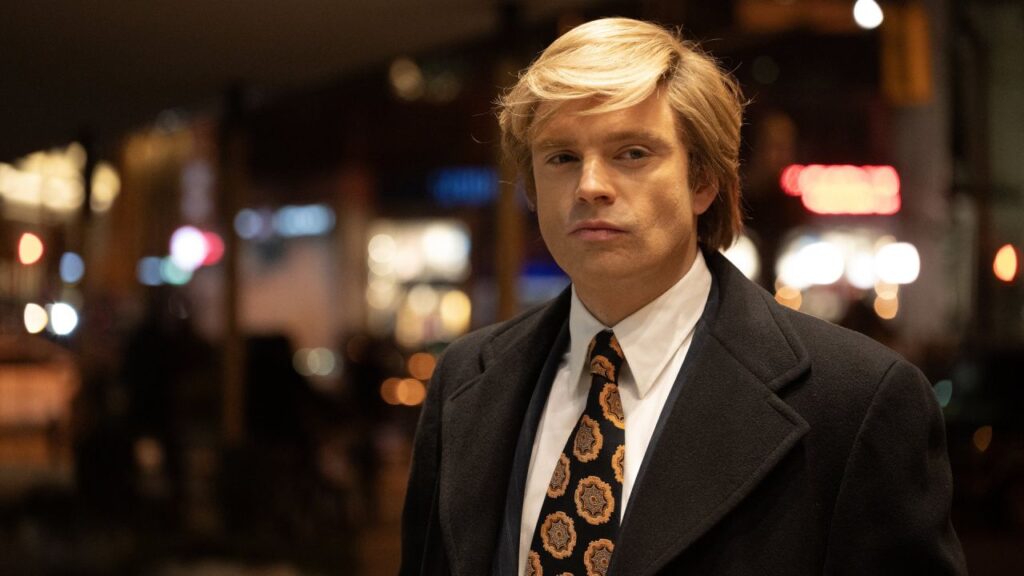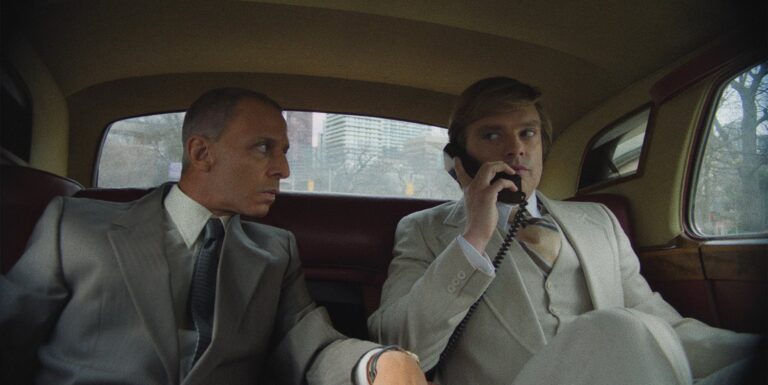Ali Abbasi’s The Apprentice is a story not just about the making of a man, but about the forging of a certain type of power — one that thrives on aggression, manipulation, and moral flexibility. Through the lens of Donald Trump’s early relationship with Roy Cohn, the film draws a line between mentor and disciple, tracing the ways in which Cohn’s cynical philosophy took root in Trump and blossomed into something even more dangerous.
The film opens with a familiar touchpoint: Nixon’s infamous “I am not a crook” speech. It’s a scene that frames the entire narrative in an era of political corruption, disillusionment, and the erosion of trust in institutions. But if Nixon was the beginning of a slide, Cohn and Trump represent something even darker, a new phase where the rules of engagement were not just bent, but broken entirely. The film positions Cohn as the architect of a worldview in which power is the only currency, and Trump as the perfect vessel for that belief system.
At the heart of the story is the question: why Trump? What about Donald Trump’s personality and upbringing made him such a natural fit for Cohn’s ruthless mentorship? Abbasi’s film doesn’t just depict Trump as an impressionable young man; it suggests that he was primed for Cohn’s influence long before they met. Raised in a world defined by wealth and status, but starved for genuine emotional connection, Trump is portrayed as a man constantly seeking validation and approval — particularly from his father, Fred Trump (Martin Donovan). Fred’s cold, dismissive attitude toward his son fosters an insecurity that leaves Donald (Sebastian Stan) desperate for the kind of respect he could never quite earn at home.
Enter Roy Cohn (an electrifying Jeremy Strong). When Cohn spots Trump in a swanky Manhattan bar, aimlessly boasting about billionaires, he immediately identifies something useful in him. Trump’s hunger for approval and his lack of strong moral grounding make him ripe for molding. Cohn doesn’t just offer him mentorship; he offers him a framework for success, built on ruthless efficiency. Through Cohn’s lens, morality becomes an obstacle, and power the ultimate goal.
Cohn’s ideological blueprint is simple but devastating: attack first, admit nothing, deny everything, and never, ever back down. But more than that, it’s about constructing your own reality, where truth is defined not by facts but by the sheer force of will. Trump, with his fluid relationship to the truth and his desire for dominance, quickly adopts these principles, making them the foundation of his public and private personas.
In Abbasi’s retelling, Cohn isn’t just a mentor; he’s a father figure Trump had been searching for, a man whose cold-blooded strategies offered Donald the approval he couldn’t find from Fred. Yet, the relationship is far from sentimental. Trump is drawn to Cohn not out of love or admiration but because Cohn provides him with the tools he needs to get ahead. Cohn’s mentorship is transactional, and Trump, always looking for the upper hand, eagerly accepts the terms.

Sebastian Stan’s portrayal of Trump leans into this transformation with skill, subtly capturing Trump’s shift from a somewhat insecure young man to the brash figure who would come to dominate the world stage. He avoids falling into the trap of caricature, focusing instead on Trump’s developing confidence and growing mastery of Cohn’s methods. It’s a performance that hinges less on mannerisms and more on psychological evolution, with Stan showing us a Trump who is learning, observing, and becoming more dangerous by the day.
On the other hand, Jeremy Strong’s Roy Cohn is a force of nature. This could easily have veered into cartoon villain territory, but instead, Strong portrays Cohn as a deeply strategic, almost mesmerizing figure who operates without the constraints of morality or guilt. His influence over Trump is not so much a seduction as it is an indoctrination, planting the seeds of an ideology that prioritizes loyalty above all, and sees enemies in anyone who doesn’t bend to his will.
It’s through this lens that Abbasi explores how Cohn’s view of power and loyalty reshaped Trump’s understanding of both. For Cohn, loyalty was absolute — those who were loyal were protected, while those who wavered were ruthlessly destroyed. This binary view of the world became Trump’s modus operandi, a mindset that would later shape his approach to politics, business, and even personal relationships. In Trump’s world, there are only winners and losers, allies and enemies. This worldview, passed down from Cohn, would come to define Trump’s rise to power.
The Apprentice raises uncomfortable questions about the nature of power and influence. Trump’s ascent is shown not as the result of political acumen or genius, but as the natural outcome of a man who learned early on that in a world shaped by people like Roy Cohn, success comes not to those who are good, but to those who are willing to do whatever it takes. By the end of the film, what remains most striking is the realization that Trump’s methods are not new; they’re inherited. And that may the film’s most unsettling insight: Trump’s approach to power is not an aberration, but a continuation of Cohn’s legacy. What began as a tutelage in the art of ruthless domination evolved into a blueprint for one of the most controversial figures in modern American history.
The craftsmanship behind the film is undeniable — Abbasi knows how to build tension and frame scenes with finesse — but The Apprentice is unlikely to surprise those familiar with Trump’s rise. Instead, it reaffirms much of what we already know, but still remains an engaging ride, especially for fans of powerhouse performances, and offers a disturbing (and yes, entertaining) exploration of how a man, driven by insecurity and guided by a ruthless mentor, came to reshape not only his own image but an entire political landscape.

